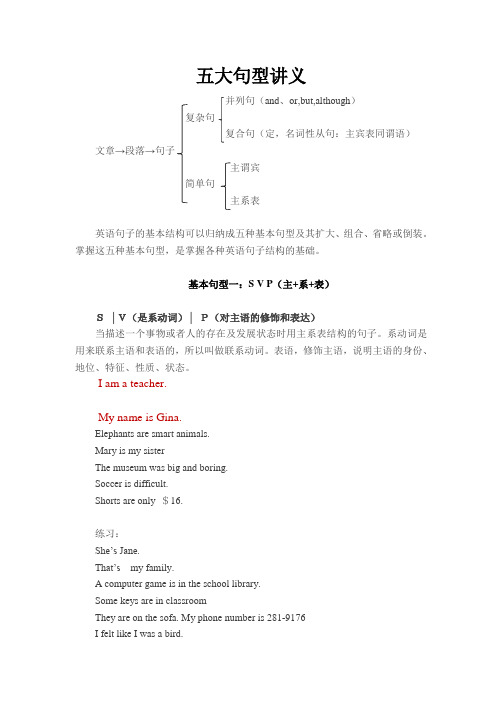五大基本句型
- 格式:doc
- 大小:26.50 KB
- 文档页数:1

英语五大基本句型结构基本句型一:SV(主+谓)Subject(主语)+Verb(谓语)这种句型中的动词大多是不及物动词(英语中按动词后可否直接跟宾语,可把动词分成不及物动词与和及物动词。
不及物动词:字典里词后标有vi。
的就是不及物动词。
不及物动词后不能直接跟有动作的对象(即宾语)。
若要跟宾语,必须先在其后添加上某个介词,如to,of,at后方可跟上宾语.具体每个动词后究竟加什么介词就得联系动词短语了,如listen to,look at….),不及物动词常见的有:appear,apologize,arrive,come,die,disappear,exist,fall,happen,rise(好像还有所有的感官动词(如以上的listen-—Eragon注)等等.如:The students work very hard。
学生们学习很努力.She apologized to me again. 她再次向我道歉。
The accident happened yesterday evening。
事故是昨天晚上发生的。
(happen是不及物动词,但表示“某地(某时)发生了什么事”,常用“sth。
+ happen +地点/时间”这一结构来表达,此时主语应是事情;表示“某人出了某事(常指不好的事)”,要用“sth.+ happen+to sb。
”这一结构来表达-—Eragon注)基本句型二:SVP(主谓表)(好像有的叫SVC(主系表)——Eragon注)Subject(主语)+Link。
V(系动词)+redicate(表语)(表语是用来说明主语的身份、性质、品性、特征和状态的,表语常由名词、形容词、副词、介词短语、不定式、动词的-ing、从句来充当,它常位于系动词(be, become, appear, seem, look, sound, feel, get, smell等词)之后.——Eragon注)这种句型中的系动词一般可分为下列两类:(1)表示状态的连系动词.这些词有:be, look, seem, appear, smell, taste, sound, keep, remain,等等。

英语中的五大基本句型
1.主语+系动词+表语,该句型简称为主系表结构。
系动词包括be动词,表示感官的系动词,表示持续的系动词,表示表像系动词,表示变化的系动词,表示终止的系动词。
2.主语+谓语
该句型简称为主谓结构,谓语为不及物动词(英文缩写为vi)或部分动副结构的短语动词。
这与汉语的主谓结构语序一致。
Birds can fly. 鸟会飞。
The students rushed out.
3.主语+谓语+宾语
该句型简称为主谓宾结构,谓语为及物动词(英文缩写为vt)或不及物动词+介词的动词短语。
这与汉语的主谓宾结构语序一致。
I enjoy sports.我喜欢运动。
4.主语+谓语+间接宾语+直接宾语
该句型简称为主谓宾宾结构,间接宾语一般是人,直接宾语一般是物,可借助介词to或for交换两个宾语的位置,直接宾语和间接宾语统称为双宾语。
He bought his daughter a book.
5.主语+谓语+宾语+宾语补足语
该句型简称为主谓宾宾补结构,宾语和宾补一起构成复合宾语。
能够跟复合宾语的常用动词有很多,多是表感官和使役的动词,多种形式可以做宾语补足语:不定式,现在分词,过去分词,形容词,副词,介词短语,名词等。
He found the book (to be) difficult.
He found the girl lying on the ground.。



五大基本句型句子的分类按结构分:简单句、并列句、复合句按用途分:陈述句(肯定和否定)、疑问句(一般、特殊、选择、反意)、祈使句、感叹句、倒装句一.简单句(核心成分:主语+谓语)(一)五种基本句型:1.S+Vi 主谓2.S+Vt+O 主谓宾3.S+Vt+Oi+Od 主谓+间接宾语(sb.)+直接宾语(sth.)S+Vt+Od+to/for+Oi4.S+Vt+O+C 主谓宾+宾补5.S+V+P 主系表(二)简单句的变化(长句结构)在句子结构不变的前提下,可以适当加入修饰成分提升句子的难度。
E.g. Birds fly.(1)改变时态:Birds will fly.(2)变否定:Birds will not fly.(3)添加形容词做定语、添加副词做方式状语Little birds fly happily.(4)添加时间、地点状语:In autumn, little birds will fly happily in the sky.二.简单陈述句的语序叙述一件事情的陈述句都是简单陈述句一个简单陈述句可以由6部分组成。
主语和谓语是核心,时间状语可以放在句首或句尾练习:将下列单词按正确的语序排列组成句子,并写在表格内。
1.sun, rises, the, red2. passed, time, quickly, very3.tell, did, not, John, manager, the, the, truth4. he, five hundred, the, necklace, spent, on, dollars5. successfully, they, carried out, plan, the6. last ,rise, the, meat, price, of, month7. at, 8:00 a.m. , class, in, schools, begins四. 综合练习(一)指出划线部分的句子成分1. The students got on the school bus.2. He handed me the newspaper.3. I will answer your question after class.4. The apples tasted sweet.5. I made my parents proud.6. It tastes good.7. He took many photos of the palaces in Beijing.8. He hates me.9. We found him a very good pupil.10. I wish you a happy New Year.(二)写出下列句子的基本句型11. She is a very beautiful lady.12. He closed the door.13. The city will become rich.14. Grandma cooked us a nice meal.15. The train is leaving.16. Time flies.17. He has fetched us some new textbooks.18. I have changed my mind.19. I sent you an e-mail.20. Teachers will make your English better.(三)选择题1. can learn how to surf the Internet safely and effectively in computer lessons.A) You B) Your C) Yours D) Yourself2. He looked at the young man and couldn’t say a word.A) friendly B) angrily C) lonely D) lovely3. Traffic jams in our city lots of questions about transport policy.A) has risen B) have risen C) have raised D) has raised4. We are very happy to learn that Mr. Lee will teach Maths this term.A) we B) our C) us D) ourselves5. The fried chicken in KFC tastes , but having too much is unhealthy.A) good B) well C) bad D) badly四. 词转(先分析句子结构)1. The ____________________________ in the right comer is Martin’s youngest aunt. (act)2. The chance to meet new people with fresh views helps encourage the ____________ of one’s mind. (develop)3. My brother has made a ___________________ to go abroad for further studies, (decide)4. Our goal is to _______________________ people’s lives through communications, (rich)5. My parents are always strict with me and what about_________________________? (you)6. Eating vegetables and doing exercise regularly will _________________ us to have a long life. (able)7. All these interesting experiments can __________________________ our knowledge. (wide)8.___________________ is more important than anything else. No one wants to lose it. (free)9. Their school is near the beach, quite similar with______________________________. (our)10. Shall we _________________the neighbours to our daughter’s birthday party? (invitation)11.We are supposed to complete all the work by tomorrow, but it is____________________. (possible)12. The wind blew over my face ____________________ and I felt so comfortable, (gentle)13.I really can’t _________________ answer that question you just asked. (possible)14.D amin was a _____________________. He usually went fishing with a boat in the lateafternoon. (fish)15.I hadn’t seen Andera for ages. When I appeared before him, he looked very __________.(surprise)16.A fter discussing for a whole day, they reached a _____________ at last. (conclude)17.T hey boy fell into the river, and a passerby heard the cry and went to _________ him.(safe)18.T hose girls enjoyed ______________________ in the party last night. (they)19.T he ______________ of his daughter in the traffic accident made him very sad. (die)20.S hanghai International Marathon and Half Marathon _____________ lots of runners eachyear. (attractive)。

五大句型讲义Both are correct English, but the first one sounds less polite.It is very quiet and I enjoy reading there.基本句型二:S V O(主+谓+宾)S│V(及物动词)│ O当一个事物或者人发出一个动作由第三者承担时,这样的句子结构叫做主谓宾结构。
I teach him.He teach me.I buy a book.1. Who knows the answer? 谁知道答案?2. He has refused to help them. 他拒绝帮他们。
3. He enjoys reading. 他喜欢看书。
4. They ate what was left over. 他们吃了剩饭。
5. He said "Good morning." 他说:"早上好!"6. I want to have a cup of tea. 我想喝杯茶。
7. He admits that he was mistaken. 他承认犯了错误。
总练习:划分下列句子成分He’s about thirty years old.Yellow sweaters are only $12!My dream is to be a scientist.John’s birthday dinner is next week.Talent shows are getting more and more popular.I always get better grades than he does,so maybe I should help him more.But many of the old buildings are still here.Every class was like a bad dream.They painted the door green.This set/made them think.They found the house deserted. 他们发现那房子无人居住。
五大基本句型及例句一、陈述句陈述句是最基本的句型,用来陈述一个事实或描述一个情况。
以下是一些例句:1. 我昨天去了电影院。
2. 这本书非常有趣。
3. 他是一位优秀的画家。
4. 今天天气很好。
5. 学习英语需要坚持不懈。
二、疑问句疑问句用来提问,希望得到对方的回答。
以下是一些例句:1. 你喜欢吃什么水果?2. 你几点起床?3. 他是谁?4. 你去不去参加聚会?5. 这个问题怎么解决?三、祈使句祈使句用来表达请求、命令、建议或建议。
以下是一些例句:1. 请帮我拿一下这个包。
2. 别忘了明天开会。
3. 多喝水,保持健康。
4. 请给我一杯咖啡。
5. 珍惜时间,努力学习。
四、感叹句感叹句用来表达惊讶、赞美、喜悦等情感。
以下是一些例句:1. 天哪,这个景色真美!2. 哇,你的新发型看起来很酷!3. 太好了,我通过了考试!4. 真是太感谢你的帮助了!5. 哦,我的天啊,这是怎么发生的?五、条件句条件句用来表示假设、条件或可能性。
以下是一些例句:1. 如果明天下雨,我们就不去郊游了。
2. 要是你来的话,我会很高兴。
3. 如果他努力学习,他一定能考好成绩。
4. 如果你需要帮助,随时告诉我。
5. 假如我有足够的时间,我会去旅行。
总结:陈述句、疑问句、祈使句、感叹句和条件句是五大基本句型。
通过这些句型可以表达不同的意思和情感,丰富语言表达。
在使用这些句型时,要注意语法和语义的准确性,使句子更加清晰和准确。
1.主语+谓语说明“某人或某物如何动作”或“某人或某物自身怎样运动”2.主+谓+宾说明“某人或某物做什么事情”或“某人或某物发出了动作,并且其动作涉及到另一个人或物”3.主语+谓语+间接宾语+直接宾语(主谓双宾结构)说明“某人(间接宾语)为谁做某事”或“某人或物的运动涉及到两个对象,其中一个间接对象为人,另一个为物”4.主语+谓语+宾语+宾语补足语(主谓宾补结构)说明“某人或某物要求(使、让)某人做什么”或“某人感觉某物怎么样”5.主语+have宾语(“拥有”句型)说明“某人或某物拥有什么”宾语可数不可数区别6.There+be+主语+其他(“存在”句型)说明“在某地或某事存在某人或某物”7.主语+系动词+表语(“主系表”结构)说明“某人/某物/某事/某种概念具有什么特征或处于什么状态”常用的系动词:be、keep、lie、remain、stand、become、fall、get、go、grow、turn、look、feel、seem、smell、sound、taste8.比较句型①同级比较:...as+形容词/副词原级+as......as+形容词+名词+as...②差比较:...less+形容词/副词原级+than...③优比较:...+形容词/副词比较级+than......the+形容词/副词比较级+of the two...(两个之中...比较好)④最高级:the+形容词/副词最高级(单数名词/one)+{of(among)+人或物}9.It+is/was+强调部分(主、宾、状)that/who从句(强调句型)说明“某一动作或事情属于什么性质或具有什么特征”It是形式主语,真正的主语是to do结构或that从句◇第一种句型:主语+不及物动词该句型所用动词都是不及物动词,其后当然不能接宾语,但是可以用状语修饰谓语动词或整个句子。
Herunsfastinthestreet.他在街上跑得飞快。
五大基本句型
一、主语+谓语(S+V)
1.Class begins.
2.They walked and laughed.
3.We won’t, we promise!
4.Lucy dances beautifully.
5.The old man has lived here for 10 years.
注意:该句型无被动语态
二、主语+系动词+表语(S+Link-V+P)
1.MoYan is a writer.
2.Confidence is really important.
3.The Harry Potter books are quite popular.
4.This food looks inviting.
5.My grandma is in good health.
6.Her hobby is collecting stamps.
7.My dream is to work for foreign tourists as a tour guide.
三、主语+谓语+宾语(S+V+DO)
1.Sophia waited for a reply.
2.I love the Internet.
3.We never beat children.
4.My sister will fix everything.
5.I will pick up rubbish from the ground.
6.You can plant a tree or build a birdhouse.
7.I dreamed a terrible dream.
四、主语+谓语+间接宾语+直接宾语(S+V+IO+DO)
1.I will write you a long letter.=I will write a long letter to you.
2.She gave the photo to her sister.=She gave her sister the photo.
3.He bought you nothing.=He bought nothing for you.
4.My mother made a miniskirt for me.
5.This training program can give you a lift at work.
6.I will give them a call right now.
五、主语+谓语+宾语+宾语补足语(S+V+DO+OC)
1.I like physics best.
2.I found the book easy.
3.I will let him go.
4.They painted the door red.
5.Tom got his bad tooth pulled out yesterday.
6.Lizzy can’t make herself understand in English.
7.The young couple named their little baby Aaron.
8.Even the best writers sometimes find themselves lost for words.
9.He makes it a rule to go for a walk before breakfast.。